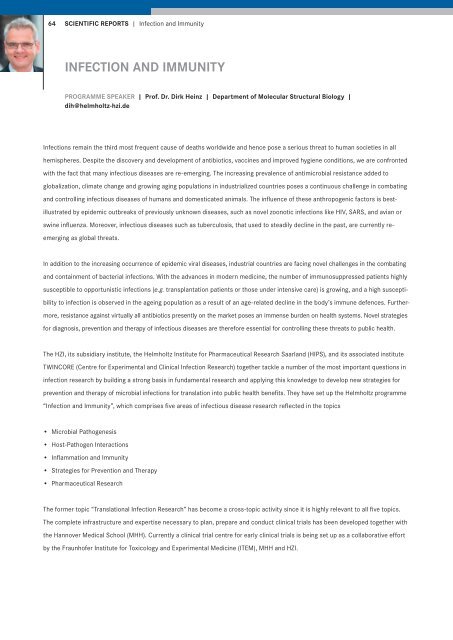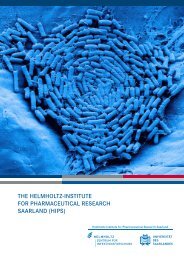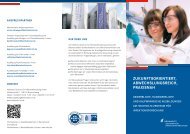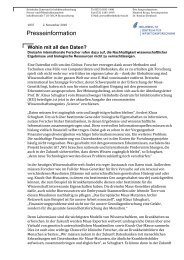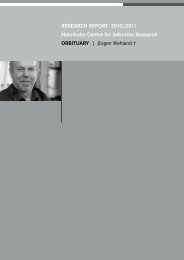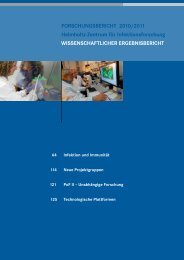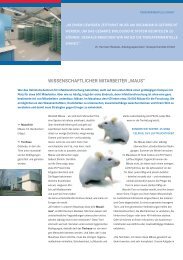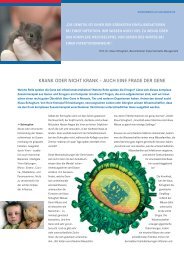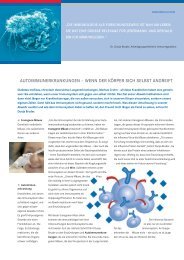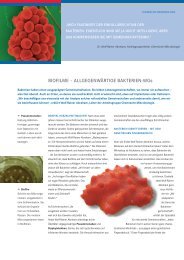Research Report 2010 2011 - Helmholtz-Zentrum für ...
Research Report 2010 2011 - Helmholtz-Zentrum für ...
Research Report 2010 2011 - Helmholtz-Zentrum für ...
You also want an ePaper? Increase the reach of your titles
YUMPU automatically turns print PDFs into web optimized ePapers that Google loves.
64 SCIENTIFIC REPORTS | Infection and Immunity<br />
INFECTION AND IMMUNITY<br />
PROGRAMME SPEAKER | Prof. Dr. Dirk Heinz | Department of Molecular Structural Biology |<br />
dih@helmholtz-hzi.de<br />
Infections remain the third most frequent cause of deaths worldwide and hence pose a serious threat to human societies in all<br />
hemispheres. Despite the discovery and development of antibiotics, vaccines and improved hygiene conditions, we are confronted<br />
with the fact that many infectious diseases are re-emerging. The increasing prevalence of antimicrobial resistance added to<br />
globalization, climate change and growing aging populations in industrialized countries poses a continuous challenge in combating<br />
and controlling infectious diseases of humans and domesticated animals. The infl uence of these anthropogenic factors is bestillustrated<br />
by epidemic outbreaks of previously unknown diseases, such as novel zoonotic infections like HIV, SARS, and avian or<br />
swine infl uenza. Moreover, infectious diseases such as tuberculosis, that used to steadily decline in the past, are currently reemerging<br />
as global threats.<br />
In addition to the increasing occurrence of epidemic viral diseases, industrial countries are facing novel challenges in the combating<br />
and containment of bacterial infections. With the advances in modern medicine, the number of immunosuppressed patients highly<br />
susceptible to opportunistic infections (e.g. transplantation patients or those under intensive care) is growing, and a high susceptibility<br />
to infection is observed in the ageing population as a result of an age-related decline in the body’s immune defences. Furthermore,<br />
resistance against virtually all antibiotics presently on the market poses an immense burden on health systems. Novel strategies<br />
for diagnosis, prevention and therapy of infectious diseases are therefore essential for controlling these threats to public health.<br />
The HZI, its subsidiary institute, the <strong>Helmholtz</strong> Institute for Pharmaceutical <strong>Research</strong> Saarland (HIPS), and its associated institute<br />
TWINCORE (Centre for Experimental and Clinical Infection <strong>Research</strong>) together tackle a number of the most important questions in<br />
infection research by building a strong basis in fundamental research and applying this knowledge to develop new strategies for<br />
prevention and therapy of microbial infections for translation into public health benefits. They have set up the <strong>Helmholtz</strong> programme<br />
“Infection and Immunity”, which comprises fi ve areas of infectious disease research refl ected in the topics<br />
• Microbial Pathogenesis<br />
• Host-Pathogen Interactions<br />
• Infl ammation and Immunity<br />
• Strategies for Prevention and Therapy<br />
• Pharmaceutical <strong>Research</strong><br />
The former topic “Translational Infection <strong>Research</strong>” has become a cross-topic activity since it is highly relevant to all fi ve topics.<br />
The complete infrastructure and expertise necessary to plan, prepare and conduct clinical trials has been developed together with<br />
the Hannover Medical School (MHH). Currently a clinical trial centre for early clinical trials is being set up as a collaborative effort<br />
by the Fraunhofer Institute for Toxicology and Experimental Medicine (ITEM), MHH and HZI.


